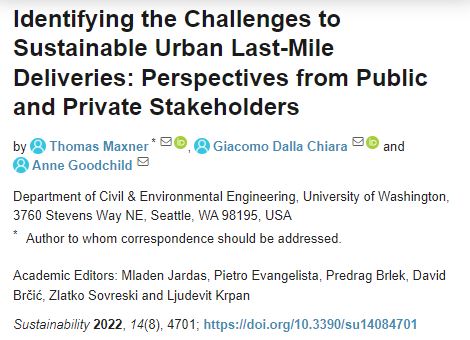
April 14, 2022 — Urban Freight Lab researchers Thomas Maxner, Giacomo Dalla Chiara, and Anne Goodchild have published a new paper, “Identifying the Challenges to Sustainable Urban Last-Mile Deliveries: Perspectives from Public and Private Stakeholders“, in Sustainability. This paper is part of project on Roadblocks to Sustainable Urban Freight, funded by Amazon, in which researchers interviewed stakeholders from both the public sector and private industry, aiming to identify and understand the barriers to decarbonizing urban freight.
Freight transportation is necessary to sustain cities’ social and economic life, and also accounts for a significant portion of carbon dioxide (CO2) emissions. The urban freight ecosystem is a complex network of both public and private agents. While reducing CO2 emissions from urban freight requires collaboration and coordination between those agents, their motivations behind their goals, strategies for achieving those goals, and the challenges faced by each may differ.
UFL researchers interviewed officials from purposefully sampled city departments in North America and private companies involved in city logistics. They found that cities face challenges related to a lack of strong leadership, resources, and policy tools. Companies must consider technological challenges, financial costs, and their workforce before reducing emissions. Cities and companies alike are challenged by the disaggregated nature of an urban freight system that is not organized at the municipal scale that is driven by performance and customer expectations.
Read more:
- Urban Freight Lab Research Project: Roadblocks to Sustainable Urban Freight
- Urban Freight Lab Technical Report: Mapping the Challenges to Sustainable Urban Freight
- Our Impact
- Current research
- Our members
- How we work
- Join the lab
- In the media
About the Urban Freight Lab (UFL): The Urban Freight Lab is a structured partnership of academic researchers, public sector agencies, and private sector firms — shippers, retailers, tech providers, property owners, and manufacturers — working collaboratively to identify complex urban freight management problems and design solutions to make industry more efficient and cities more sustainable and livable.